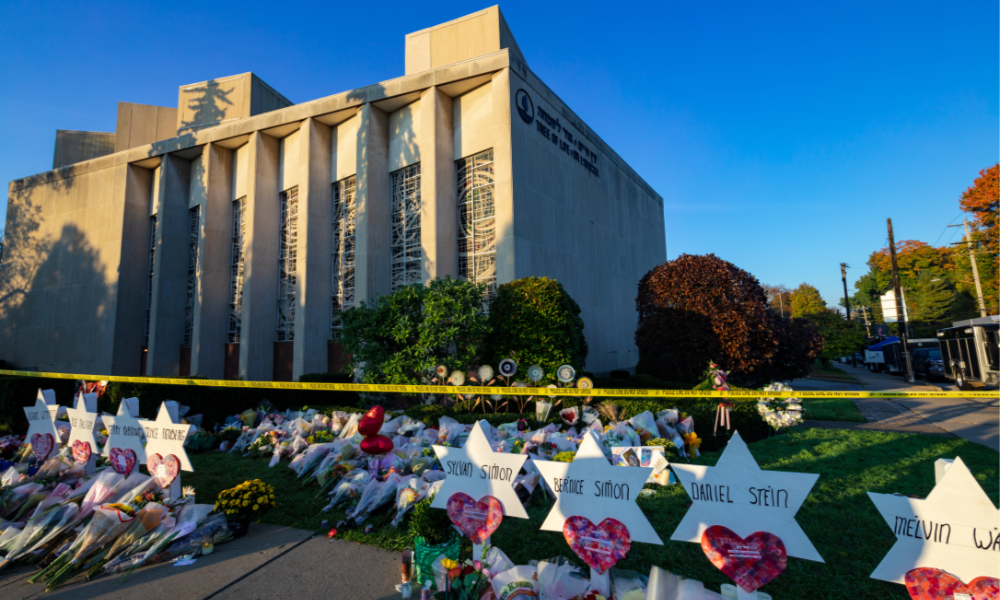Reflections on the Five-Year Commemoration of the Pittsburgh Synagogue Shooting

Resilience, Continuing Need, and the Exacerbating Effects of Anti-Semitism
By Dean G. Kilpatrick, Anne Seymour, & Alyssa A. Rheingold
October 27, 2023
Five years ago on October 27, 2018, the Jewish community in Pittsburgh experienced a domestic terrorist attack at the Tree of Life Synagogue while three congregations, Tree of Life, the New Light, and Dor Hadash, were gathered for Shabbat morning services. This anti-Semitic hate crime killed 11 people, physically injured six, and terrorized the entire community. We at the National Mass Violence Victimization Resource Center (NMVVRC) have been privileged to provide information and support to the 10.27 Healing Partnership Resiliency Center in Pittsburgh as it assists the Jewish community in the long and stressful recovery process. We also conducted needs assessment surveys of adults in the broader Pittsburgh community. As we reflect on the fifth anniversary of this tragic event, we express our profound admiration and support for the survivors of this horrific hate crime and share the following reflections.
Mass violence changes lives forever, and there is no going back to who you were before the event. Having said that, it is important to understand that many individuals show great strength after mass violence and are able to function well notwithstanding the many challenges they face. Others will have more difficulty. We at the NMVVRC know that many in the Pittsburgh Jewish community have been strong and resilient, but that many others are still struggling and have unmet behavioral health needs. We recognize that some can be both resilient and struggle at the same time over the course of their recovery journey. We also know that the emotional impact of hate-based terrorist attacks, including the shooting at the Pittsburgh Synagogue, can be exacerbated by things that happened before, during, and after the attack itself.
For Jews in Pittsburgh and elsewhere in America, anti-Semitism is one such exacerbating factor. Throughout history, the Jewish people have been subjected to anti-Semitism in word and deed including the Holocaust, which killed six million Jews and attempted to wipe all Jews off the face of the earth. Jews know all too well that anti-Semitism is not benign and that anti-Semitic words frequently are followed by anti-Semitic deeds of violence. When an anti-Semitic mass violent attack happens, survivors and other Jews know that terrorist perpetrators are not just trying to kill or maim, but to intimidate all Jews by sending a message that no Jew is safe. Therefore, it is not surprising that the long history of anti-Semitism before the Pittsburgh synagogue shooting made the victims more vulnerable to the shooting’s behavioral and mental health impact.
What effects might we expect the October 7th anti-Semitic terrorist attacks on Jews in Israel by Hamas to have on Jewish survivors in Pittsburgh and elsewhere in America? This has been described as the deadliest day for Jews since the Holocaust, and there has been widespread media and social media coverage of atrocities committed by the terrorists. The ripple effects of these terrorist attacks have spread far and wide and have hit Jewish people around the world hard, particularly those in Pittsburgh. Again, there is every reason to believe that these attacks have ripped a scab off the wounds experienced by the Pittsburgh synagogue survivors and exacerbated their problems. We also know that many have concerns that anti-Semitism will result in additional violence directed at Jews in America.
At the NMVVRC, we believe that anti-Semitism, anti-Palestinian, or hate-based prejudice against any religious, racial, ethnic, or gender group, is not acceptable and must be wholeheartedly condemned by all. We recognize how stressful these events in the Middle East are for the Pittsburgh Jewish community and validate their needs and concerns. We also know from research that excessive media exposure to terrorist attacks and their aftermath exacerbates, not relieves, fear, anxiety, and distress. If watching media coverage of these events is distressing, please limit your exposure. We offer resources below to assist in managing trauma cues, the 5-year commemoration of the Pittsburgh synagogue shooting, having conversations with children about anti-Semitism, and taking care of yourself.
Finally, we should draw wisdom and strength from others in the past who suffered, but survived, unspeakable horrors. One such individual was Viktor Frankl, a Jewish Austrian psychiatrist who survived the Nazi death camps during World War II. He gives us hope that it is possible to overcome unspeakable tragedy by finding meaning in what happened:
“There is nothing in the world, I venture to say, that would so effectively help one to survive even the worst conditions as the knowledge that there is a meaning in one's life.”
We at the NMVVRC know that the lives of those who were killed in the Pittsburgh synagogue shooting mattered and had meaning, as do the lives of those who survived this tragedy. We honor them and can add meaning to their lives as well as our own, by opposing anti-Semitism, other forms of hate and prejudice, terrorism, and injustice for all victims of hate crimes and terrorism. May their memory be a blessing.
Resources:
Trauma Cues Related to Mass Violence Incidents (pdf)
Resilience Following Hate Crimes: Information and Tips (pdf)
10.27 Healing Partnership Five Year Commemoration Ceremony
Talking to Children About Hate Crimes (pdf)
Talking to Children about Hate Crimes and Anti-Semitism (NCTSN) (pdf)
Information about Transcend NMVC Mobile app
Hate-Motivated Mass Violence Crimes NMVVRC National Town Hall
System.NullReferenceException: Object reference not set to an instance of an object. at ASP._Page_Views_Partials_trainingResource_cshtml.Execute() in E:\Sites\NMVC.Umbraco\Views\Partials\trainingResource.cshtml:line 0 at System.Web.WebPages.WebPageBase.ExecutePageHierarchy() at System.Web.Mvc.WebViewPage.ExecutePageHierarchy() at System.Web.WebPages.WebPageBase.ExecutePageHierarchy(WebPageContext pageContext, TextWriter writer, WebPageRenderingBase startPage) at Umbraco.Web.Mvc.ProfilingView.Render(ViewContext viewContext, TextWriter writer) in D:\a\1\s\src\Umbraco.Web\Mvc\ProfilingView.cs:line 25 at System.Web.Mvc.Html.PartialExtensions.Partial(HtmlHelper htmlHelper, String partialViewName, Object model, ViewDataDictionary viewData) at Our.Umbraco.DocTypeGridEditor.Web.Extensions.HtmlHelperExtensions.RenderDocTypeGridEditorItem(HtmlHelper helper, IPublishedElement content, String editorAlias, String viewPath, String previewViewPath, Boolean isPreview) at ASP._Page_app_plugins_doctypegrideditor_render_DocTypeGridEditor_cshtml.Execute() in E:\Sites\NMVC.Umbraco\app_plugins\doctypegrideditor\render\DocTypeGridEditor.cshtml:line 28 at System.Web.WebPages.WebPageBase.ExecutePageHierarchy() at System.Web.Mvc.WebViewPage.ExecutePageHierarchy() at System.Web.WebPages.WebPageBase.ExecutePageHierarchy(WebPageContext pageContext, TextWriter writer, WebPageRenderingBase startPage) at Umbraco.Web.Mvc.ProfilingView.Render(ViewContext viewContext, TextWriter writer) in D:\a\1\s\src\Umbraco.Web\Mvc\ProfilingView.cs:line 25 at System.Web.Mvc.Html.PartialExtensions.Partial(HtmlHelper htmlHelper, String partialViewName, Object model, ViewDataDictionary viewData) at ASP._Page_Views_Partials_grid_editors_Base_cshtml.Execute() in E:\Sites\NMVC.Umbraco\Views\Partials\grid\editors\Base.cshtml:line 20

10.27 Healing Partnership Director Maggie Feinstein's guest column in the Pittsburgh Jewish Chronicle
"We see humanity when we see each other"
WE REMEMBER
Joyce Fienberg
Rich Gottfried
Rose Mallinger
Jerry Rabinowitz
Cecil Rosenthal
David Rosenthal
Bernice Simon
Sylvan Simon
Dan Stein
Irving Younger
Mel Wax
